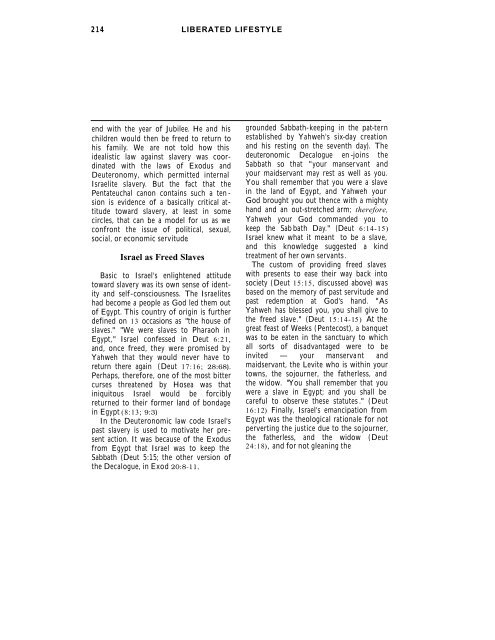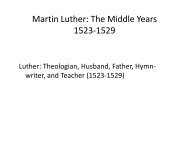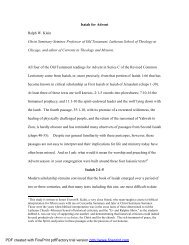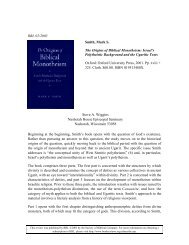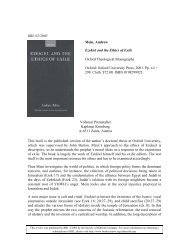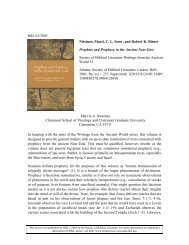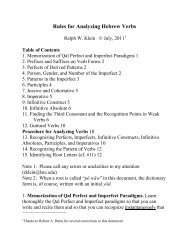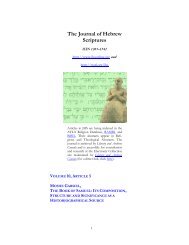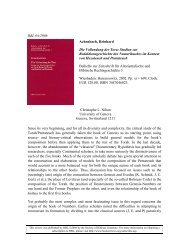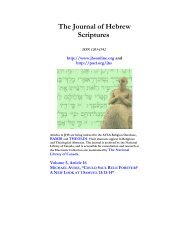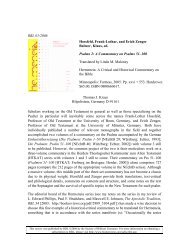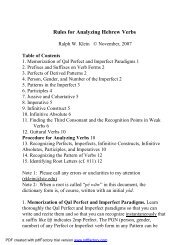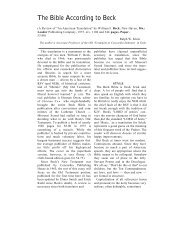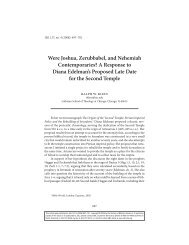A Liberated Lifestyle: Slaves and Servants in Biblical Perspective
A Liberated Lifestyle: Slaves and Servants in Biblical Perspective
A Liberated Lifestyle: Slaves and Servants in Biblical Perspective
Create successful ePaper yourself
Turn your PDF publications into a flip-book with our unique Google optimized e-Paper software.
214 LIBERATED LIFESTYLE<br />
end with the year of Jubilee. He <strong>and</strong> his<br />
children would then be freed to return to<br />
his family. We are not told how this<br />
idealistic law aga<strong>in</strong>st slavery was coord<strong>in</strong>ated<br />
with the laws of Exodus <strong>and</strong><br />
Deuteronomy, which permitted <strong>in</strong>ternal<br />
Israelite slavery. But the fact that the<br />
Pentateuchal canon conta<strong>in</strong>s such a ten -<br />
sion is evidence of a basically critical attitude<br />
toward slavery, at least <strong>in</strong> some<br />
circles, that can be a model for us as we<br />
confront the issue of political, sexual,<br />
social, or economic servitude.<br />
Israel as Freed <strong>Slaves</strong><br />
Basic to Israel's enlightened attitude<br />
toward slavery was its own sense of identity<br />
<strong>and</strong> self-consciousness. The Israelites<br />
had become a people as God led them out<br />
of Egypt. This country of orig<strong>in</strong> is further<br />
def<strong>in</strong>ed on 13 occasions as "the house of<br />
slaves." "We were slaves to Pharaoh <strong>in</strong><br />
Egypt," Israel confessed <strong>in</strong> Deut 6:21,<br />
<strong>and</strong>, once freed, they were promised by<br />
Yahweh that they would never have to<br />
return there aga<strong>in</strong> (Deut 17:16; 28:68).<br />
Perhaps, therefore, one of the most bitter<br />
curses threatened by Hosea was that<br />
<strong>in</strong>iquitous Israel would be forcibly<br />
returned to their former l<strong>and</strong> of bondage<br />
<strong>in</strong> Egypt (8:13; 9:3)<br />
In the Deuteronomic law code Israel's<br />
past slavery is used to motivate her present<br />
action. It was because of the Exodus<br />
from Egypt that Israel was to keep the<br />
Sabbath (Deut 5:15; the other version of<br />
the Decalogue, <strong>in</strong> Exod 20:8-11,<br />
grounded Sabbath-keep<strong>in</strong>g <strong>in</strong> the pat-tern<br />
established by Yahweh's six-day creation<br />
<strong>and</strong> his rest<strong>in</strong>g on the seventh day). The<br />
deuteronomic Decalogue en -jo<strong>in</strong>s the<br />
Sabbath so that "your manservant <strong>and</strong><br />
your maidservant may rest as well as you.<br />
You shall remember that you were a slave<br />
<strong>in</strong> the l<strong>and</strong> of Egypt, <strong>and</strong> Yahweh your<br />
God brought you out thence with a mighty<br />
h<strong>and</strong> <strong>and</strong> an out-stretched arm; therefore,<br />
Yahweh your God comm<strong>and</strong>ed you to<br />
keep the Sab bath Day." (Deut 6:14-15)<br />
Israel knew what it meant to be a slave,<br />
<strong>and</strong> this knowledge suggested a k<strong>in</strong>d<br />
treatment of her own servants.<br />
The custom of provid<strong>in</strong>g freed slaves<br />
with presents to ease their way back <strong>in</strong>to<br />
society (Deut 15:15, discussed above) was<br />
based on the memory of past servitude <strong>and</strong><br />
past redemption at God's h<strong>and</strong>. "As<br />
Yahweh has blessed you, you shall give to<br />
the freed slave." (Deut 15:14-15) At the<br />
great feast of Weeks (Pentecost), a banquet<br />
was to be eaten <strong>in</strong> the sanctuary to which<br />
all sorts of disadvantaged were to be<br />
<strong>in</strong>vited — your manservant <strong>and</strong><br />
maidservant, the Levite who is with<strong>in</strong> your<br />
towns, the sojourner, the fatherless, <strong>and</strong><br />
the widow. "You shall remember that you<br />
were a slave <strong>in</strong> Egypt; <strong>and</strong> you shall be<br />
careful to observe these statutes ." (Deut<br />
16:12) F<strong>in</strong>ally, Israel's emancipation from<br />
Egypt was the theological rationale for not<br />
pervert<strong>in</strong>g the justice due to the sojourner,<br />
the fatherless, <strong>and</strong> the widow (Deut<br />
24:18), <strong>and</strong> for not glean<strong>in</strong>g the


